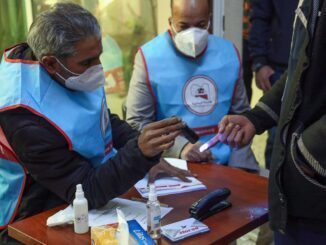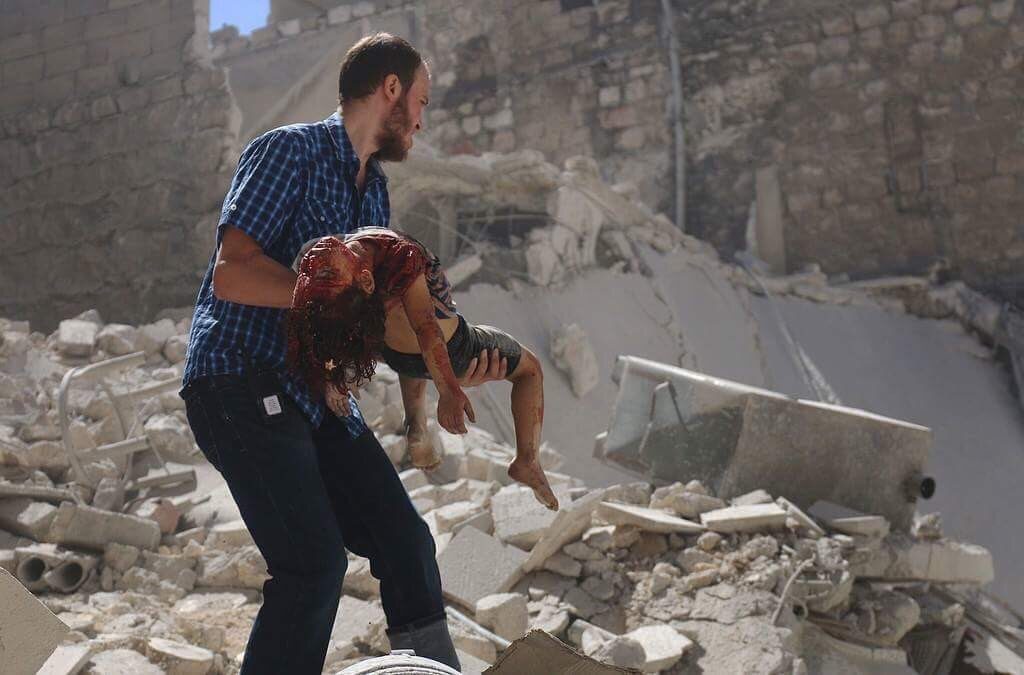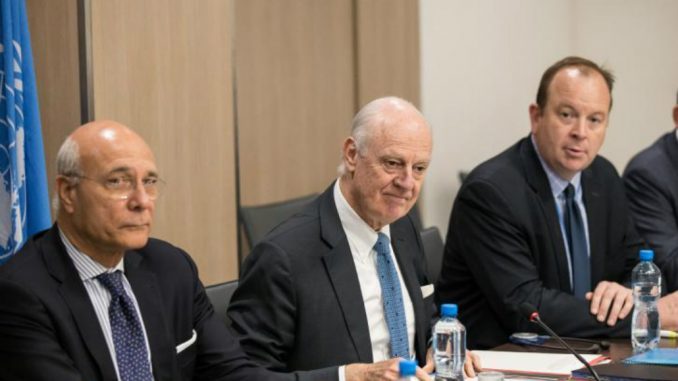
U.N. Syria envoy has warned not to expect “miracles” from the current round of peace talks, calling on Russia, Turkey, and Iran on Saturday to salvage the ceasefire as fighting raged for more than a week.
The latest round of Syria peace talks has started in Geneva on February 23. after it was previously planned to be on February 8. but delayed in order to take advantage of the results of Astana settlement about the ceasefire in Syria, which was planned by Russia, Turkey, and Iran.
De Mistura told the representatives of both delegations that they had a joint responsibility to end a conflict that had killed hundreds of thousands and displaced millions.
The opposition’s delegation accused the regime delegation of seeking to hinder the peace talks as its head said the main goal of the talks should be combating terrorism without mentioning the political process, while regime forces in Syria kept breaching the ongoing shaky truce and killed dozens of civilians since the talks started.
However, both sides could point to small victories. The opposition said that the question of political transition was seriously addressed for the first time, while U.N. envoy Staffan de Mistura said counter-terrorism – an issue pushed by Assad regime’s delegation – had been added to the agenda.
However, the current round of peace talks, which started on March 24, has been greatly affected by the latest developments on the ground.
Assad regime forces and their allies, Russia, Iran and Shi’ite militias from nearby countries, are seeking to staunch the biggest rebel assault in months, which began this week in the capital Damascus and the Hama countryside.
Syria rebels were advancing in Hama Province, as part of their biggest offensive against government forces in months.
The city of Hama remained under government control but the opposition has gained ground in the countryside; rebels have seized 11 villages and several ammunition depots since Tuesday.
Rebels fought with soldiers on the edge of the city center in the Jobar district for over a week now.
Undermining the talks
Syrian government envoy Bashar al-Jaafari accused the opposition of intentionally undermining the talks, saying an escalation of attacks over the past few days is “pushing everybody toward a total failure and fiasco in the political and diplomatic process”.
Jaafari on Friday delivered a 40-minute polemic attacking the political and armed opposition and their foreign backers, labeling them all “terrorists”.
The first three topics are collectively supposed to ensure a political transition in Syria – anathema to Assad. Jaafari said they would not be neglected, but terrorism needed to be the priority.
Short after a two-hour meeting with U.N. mediator Staffan de Mistura, which he said had focused primarily on combating terrorism, Bashar al-Jaafari told reporters he would follow up on Saturday with another meeting, again all about terrorism.
Ja’afari said Turkish-backed rebel groups were now breaking the ceasefire, and coordinating with Tahrir al-Sham, proof they were supporting terrorism and showing why terrorism needed to top the agenda.
“Anyone who objects to such an approach would simply reveal their true face which is being a sponsor of terrorism,” he said.
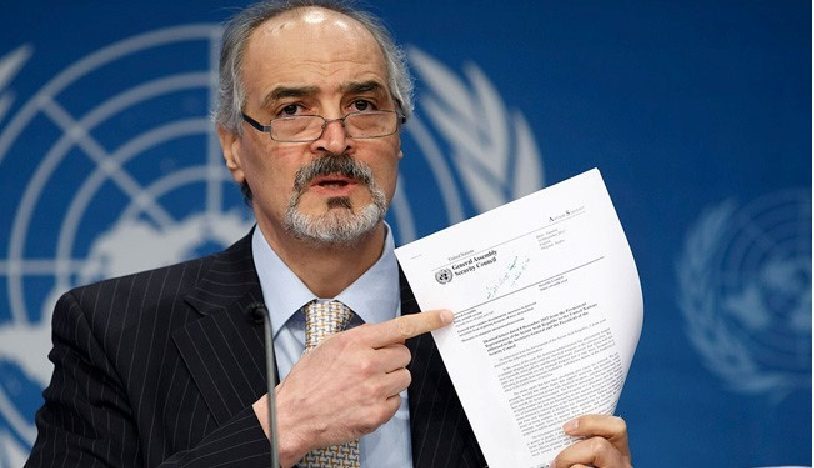
Assad regime is the source of terrorism
For his part, Nasr al-Hariri, lead negotiator of the opposition High Negotiations Committee (HNC), accused the government of targeting residential areas and carrying out arbitrary arrests.
Hariri said after meeting the U.N. envoy on Saturday that 15 civilians were killed and 70 wounded in the bombing of a market in Hamouriya in the Damascus countryside.
“I am talking about the killing machine and terror machine of the Assad regime,” Hariri said, reading the names of victims of the “massacre” to reporters in Geneva.
He also accused the government of the forced displacement of civilians and imposing “demographic change”.
“Any political solution would not be meaningful or credible if it was not accompanied with a real ceasefire on the ground,” Hariri said. “If we don’t have that real ceasefire then things will deteriorate very badly.”
Hariri said the opposition delegation and de Mistura had discussed a political transition, one of four themes that the two sides have agreed to as the agenda for this fifth round.
he added the opposition was committed to finding a political solution but insisted such a deal could not include Assad.
“We reaffirm that we here to rid our country from terrorism and I say that Syria will not be free from terrorism of ISIS … unless it is liberated first from the state terrorism practised by the regime,” Hariri told reporters.
“I would like to remind you that since the beginning of the last round of talks, last month in Geneva, at least 11 schools have been targeted, in addition to at least 11 medical centres, including hospitals and makeshift clinics, and five markets by the Assad regime’s air force and the countries that are supporting the regime.”
Hariri described the escalation of military operation around Damascus as “self-defence.”
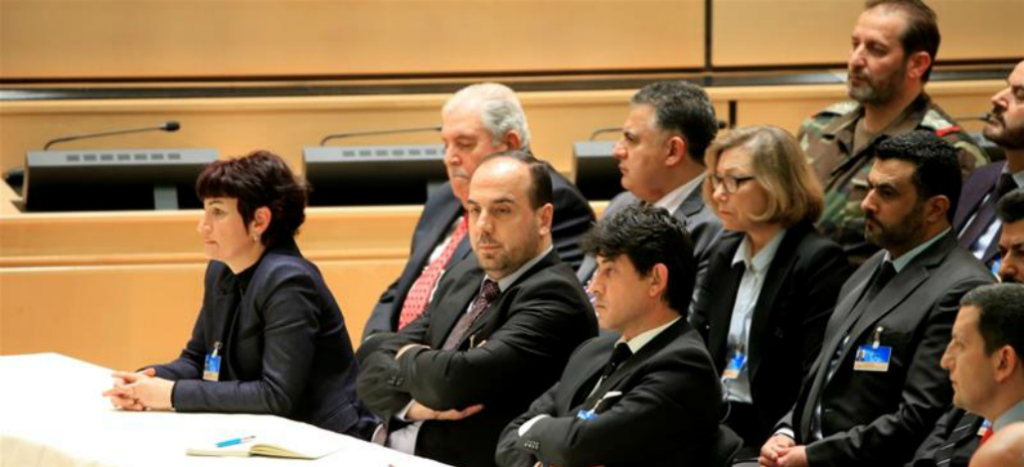
No Miracles expected, Saving the ceasefire
De Mistura said he would aim to mesh the ideas shared on all subjects by both sides when the round ends next Friday.
“I am not expecting miracles, I am not expecting breakthroughs … and I am not expecting breakdowns,” the UN envoy said, reiterating that agreement on the agenda was itself a mark of progress.
In addition, he urged the backers of separate talks in the Kazakh capital Astana – which involve Russia and Turkey and are supposed to guarantee a ceasefire – to resume more negotiations in an effort to bring the fighting to an end.
“Growing violations in recent days are undermining the ceasefire regime addressed through the Astana meetings, with significant negative consequences for the safety of Syrian civilians, humanitarian access and the momentum of the political process,” de Mistura said in a statement on the third day of peace talks.
“Our expectation and strong suggestion to the guarantors to the Astana process that they do retake the situation in hand and that hopefully there will be new Astana meeting as soon as possible in order to control the situation, which at the moment is worrisome,” he told reporters.
An analyst said that the rebels were aiming to put more pressure on the international community as they tried to bring about a political solution to the crisis.
“This is the first time in months that we’ve seen momentum being built by the rebels to take over ground, particularly in Hama,” he said.
“[The rebels] are sending a clear message to the international community that, despite the fact that they lost Aleppo last year … they can still change the reality on the ground.”
Marwan Kabalan, an analyst at the Doha Institute’s Arab Centre for Research and Policy Studies, said that little had been achieved in the talks, which were entering their fifth round.
Kabalan said that the parties should be discussing four main themes – governance, fighting “terrorism”, the constitution, and elections – but stressed that little was expected from this latest round.
“Most of the regional and international powers are not yet actually committed to solving this crisis,” he said, adding that the US was focusing more on the fight against the Islamic State [ISIS] while Turkey’s focus was on the actions of Kurdish groups in Syria.
The Syrian crisis began as a peaceful demonstration against the injustice in Syria. Assad regime used to fire power and violence against the civilians and led to armed resistance. 450.000 Syrians lost their lives in the past five years according to UN estimates, and more than 12 million have lost their homes.

